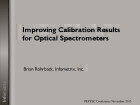Measurement and testing
Improving Calibration Results for Optical Spectrometers - presented at PEFTEC
Apr 12 2016
Author: Brian Rohrback on behalf of Infometrix Inc
A project has been undertaken to assess how to reduce the amount of effort devoted to maintaining and optimizing spectroscopic model performance in support of refinery and chemical plant labs. Over the last five years, a series of algorithmic approaches have been examined with the goal of streamlining the process of chemometric model construction to make the models significantly more robust when put into routine practice. This effort generated the following observations:
1. Even though there are published "Best Practices" for generating chemometric models, these practices are infrequently followed;
2. Recalibration of an optical spectrometer is perceived to be warranted due to changes in crude slates and blending component composition, but may not be required;
3. Even if a calibration was performed properly during initial installation, staffing changes and lack of training undermines subsequent recalibrations;
4. It is of benefit to minimize software maintenance frequency to control product giveaway.
In order to use optical analyzers effectively, the analyst needs to consider the limitations that ultimately determine the eventual success and life-expectancy of any calibration. There are many areas that have an impact on the ultimate quality of a chemometrics calibration: outlier detection, selection of number of factors, and even choice of algorithm. This presentation reports on a multi-organization effort leading to an improvement in calibration procedures for on-line and laboratory multiwavelength spectrometers. Here the process of calibration is examined in detail and a path is outlined for building calibrations that are more reliable and less sensitive to process shifts. Much of this improvement can be attained without requiring replacement of either the hardware or software in place. Additional improvement in calibration quality is available through the use of well-referenced methods that constitute the best technologies available.
Digital Edition
PIN 26.1 Feb/Mar 2025
March 2025
Analytical Instrumentation - Elemental Analysis for Quality and Process Control at Refineries, for Lubricants and Wear Metals in Engine Oils - Synthetic Lubricants: New Developments - Scaling...
View all digital editions
Events
Apr 08 2025 Birmingham, UK
Apr 08 2025 Kielce, Poland
Apr 08 2025 Ravenna, Italy
Apr 08 2025 Southampton, UK
Apr 08 2025 London, UK















